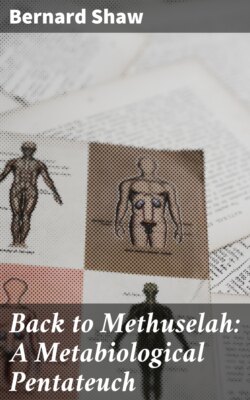Читать книгу Back to Methuselah: A Metabiological Pentateuch - Bernard Shaw - Страница 15
На сайте Литреса книга снята с продажи.
THE EARLY EVOLUTIONISTS
ОглавлениеTable of Contents
The idea of Evolution, or Transformation as it is now sometimes called, was not first conceived by Charles Darwin, nor by Alfred Russel Wallace, who observed the operation of Circumstantial Selection simultaneously with Charles. The celebrated Buffoon was a better Evolutionist than either of them; and two thousand years before Buffon was born, the Greek philosopher Empedocles opined that all forms of life are transformations of four elements, Fire, Air, Earth, and Water, effected by the two innate forces of attraction and repulsion, or love and hate. As lately as 1860 I myself was taught as a child that everything was made out of these four elements. Both the Empedocleans and the Evolutionists were opposed to those who believed in the separate creation of all forms of life as described in the book of Genesis. This 'conflict between religion and science', as the phrase went then, did not perplex my infant mind in the least: I knew perfectly well, without knowing that I knew it, that the validity of a story is not the same as the occurrence of a fact. But as I grew up I found that I had to choose between Evolution and Genesis. If you believed that dogs and cats and snakes and birds and beetles and oysters and whales and men and women were all separately designed and made and named in Eden garden at the beginning of things, and have since survived simply by reproducing their kind, then you were not an Evolutionist. If you believed, on the contrary, that all the different species are modifications, variations, and elaborations of one primal stock, or even of a few primal stocks, then you were an Evolutionist. But you were not necessarily a Darwinian; for you might have been a modern Evolutionist twenty years before Charles Darwin was born, and a whole lifetime before he published his Origin of Species. For that matter, when Aristotle grouped animals with backbones as blood relations, he began the sort of classification which, when extended by Darwin to monkeys and men, so shocked my uncle.
Genesis had held the field until the time (1707–1778) of Linnaeus the famous botanist. In the meantime the microscope had been invented. It revealed a new world of hitherto invisible creatures called Infusorians, as common water was found to be an infusion of them. In the eighteenth century naturalists were very keen on the Infusorian Amoebas, and were much struck by the way in which the members of this old family behaved and developed. But it was still possible for Linnaeus to begin a treatise by saying 'There are just so many species as there were forms created in the beginning,' though there were hundreds of commonplace Scotch gardeners, pigeon fanciers, and stock breeders then living who knew better. Linnaeus himself knew better before he died. In the last edition of his System of Nature, he began to wonder whether the transmutation of species by variation might not be possible. Then came the great poet who jumped over the facts to the conclusion. Goethe said that all the shapes of creation were cousins; that there must be some common stock from which all the species had sprung; that it was the environment of air that had produced the eagle, of water the seal, and of earth the mole. He could not say how this happened; but he divined that it did happen. Erasmus Darwin, the grandfather of Charles, carried the environment theory much further, pointing out instance after instance of modifications made in species apparently to adapt it to circumstances and environment: for instance, that the brilliant colors of the leopard, which make it so conspicuous in Regent's Park, conceal it in a tropical jungle. Finally he wrote, as his declaration of faith, 'The world has been evolved, not created: it has arisen little by little from a small beginning, and has increased through the activity of the elemental forces embodied in itself, and so has rather grown than come into being at an almighty word. What a sublime idea of the infinite might of the great Architect, the Cause of all causes, the Father of all fathers, the Ens Entium! For if we would compare the Infinite, it would surely require a greater Infinite to cause the causes of effects than to produce the effects themselves.' In this, published in the year 1794, you have nineteenth-century Evolution precisely defined. And Erasmus Darwin was by no means its only apostle. It was in the air then. A German biologist named Treviranus, whose book was published in 1802, wrote, 'In every living being there exists a capacity for endless diversity of form. Each possesses the power of adapting its organization to the variations of the external world; and it is this power, called into activity by cosmic changes, which has enabled the simple zoophytes of the primitive world to climb to higher and higher stages of organization, and has brought endless variety into nature.' There you have your evolution of Man from the amoeba all complete whilst Nelson was still alive on the seas. And in 1809, before the battle of Waterloo, a French soldier named Lamarck, who had beaten his musket into a microscope and turned zoologist, declared that species were an illusion produced by the shortness of our individual lives, and that they were constantly changing and melting into one another and into new forms as surely as the hand of a clock is continually moving, though it moves so slowly that it looks stationary to us. We have since come to think that its industry is less continuous: that the clock stops for a long time, and then is suddenly 'put on' by a mysterious finger. But never mind that just at present.
